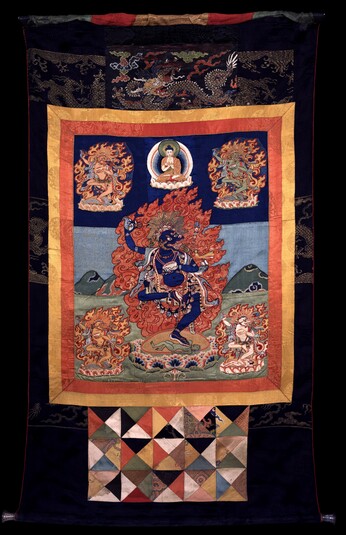
Item: Simhamukha (Buddhist Deity) - (5 deity)
| Origin Location | Bhutan |
|---|---|
| Date Range | 1700 - 1799 |
| Lineages | Buddhist |
| Material | Ground: Textile Image, Embroidery, Applique |
| Collection | Rubin Museum of Art |
Classification: Deity
Appearance: Animal-Feature
Gender: Female
Simhamukha (English: Lion-faced Goddess).
Animal-faced deities were commonplace in India. The deity shares the qualities and strengths of the animal portrayed. To be confronted by a lion means to be stopped dead on a path. The Lion-faced Goddess is a Buddha emanation that is intended to shock, stop, and quickly repel all negative forces and obstacles especially environmental contamination and associated health and emotional problems.
At the four corners, each in a different color, are four attendant figures, representing the various activities of the Lion-faced Goddess. At the top left, red and representing the western direction is the activity of having over-whelming power. The top right, north and green, is the turning back of enemies and obstacles. At the bottom left, south and yellow, is the increase of life, merit and well-being. At the bottom right, east and white, is the pacification of all sickness, spirits and emotional distress.
Although originating in northern India, the Lion-faced Goddess became very popular with the Ancient School of Tibetan Buddhism. She was quickly adopted as a special deity associated with the School?s founder, the Lotus-born One (Padmasambhava). The Goddess represented his inner power that transforms worldly existence and suffering into bliss and happiness.
This textile is unusual for the many swatches of different silk fabrics used in the brocade mount surrounding the central embroidered subject. This style of mounting was adopted from the Chinese and became more popular than the simple cotton mounts at the top and bottom of a painting or textile found in earlier Himalayan use.
"...the wisdom Dakini Simhamukha, with a body blue-black in colour, one face, two hands; three eyes, red, round and glaring; bared fangs and a curled tongue. The right hand holds aloft to the sky a curved-knife marked with a vajra. The left a blood filled skullcup to the heart, carrying a three-pointed khatvanga staff in the bend of the left elbow. Orange hair, eyebrows and beard flowing upwards, with five dry human heads as a crown and fifty wet, blood dripping, as a necklace. With five bone ornaments and a tiger skin as a lower garment; standing on the left leg with the right drawn-up, in the middle of a blazing fire of pristine awareness." [sGrub Thabs Kun bTus, vol.8, folios 288-290. Translated in 1989].
Jeff Watt 5-2005
Exhibition: Female Buddhas at RMA
Thematic Sets
Collection of Rubin Museum of Art: Bhutan
Region: Bhutan, Textiles
Collection of RMA: Best of Collection 2
Buddhist Deity: Simhamukha (5 Deity)
Textile: Main Page
Region: Bhutan: Painting & Textile Masterworks
Buddhist Deity: Simhamukha Masterworks
Buddhist Deity: Simhamukha Art History
Buddhist Deity: Simhamukha Main Page
Textile: Applique Artwork Main Page
Collection of Rubin Museum of Art: Textile Page

